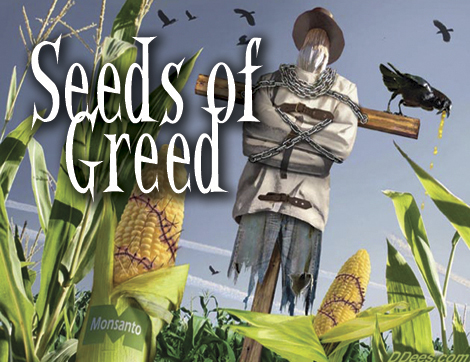
Is Monsanto the most evil corporation in the world? Many people say “yes.”
By James Spounias —
By a vote of 275 to 150, the United States House of Representatives passed on July 22, H.R. 1599, the “Safe and Accurate Food Labeling Act of 2015,” known to many as the “Deny Americans the Right to Know” (DARK) Act.
Sponsored by Michael Richard Pompeo (R-Kan.), the DARK Act is so named because the legislation keeps consumers in the dark about which foods are derived from genetically modified organisms (GMOs), preempts state efforts to mandate GMO labeling laws and creates a voluntary scheme tilted toward big agriculture’s interests. The DARK act also prohibits states and localities from banning GMO crops, as reported in this newspaper.
Why do Big Ag powerhouses oppose mandatory GMO labeling?
“If you put a label on genetically engineered food you might as well put a skull and crossbones on it,” said Norman Braksick, president of Asgrow Seed Company, a subsidiary of Monsanto, quoted in The Kansas City Star on March 7, 1994.
Notably, these House members attempted to trim the bill’s sweeping power with amendments, but failed.
Representative Jared William Huffman (D-Calif.) offered an amendment that would have added language to the legislation to ensure tribal sovereignty to ban or restrict GMO cultivation. This amendment had the closest vote, but still failed at 196 to 227.
Representative Rosa Luisa DeLauro’s (D-Conn.) amendment to prohibit the usage of the phrase “natural” on foods containing genetically engineered ingredients failed with a 163-to-262 vote.
The House struck down, 123-303, the amendment offered by Representative Peter Anthony DeFazio (D-Oreg.) that would have required U.S. food companies that label their GMO-containing products in other countries to do the same for U.S. consumers purchasing the same product.
And finally, an amendment introduced by Representatives Chellie Pingree (D-Maine), Jared Schutz Polis (D-Colo.) and DeFazio that would have eliminated the majority of the bill and left only the U.S. Department of Agriculture non-GMO certification program element of the legislation, failed on a voice vote by the House.
AMERICAN FREE PRESS has covered the details of this legislation in the “Spotlight on Congress” column on page 12 in this week’s edition, so perhaps it’s time to reflect upon a little history of how Monsanto persecutes people like 80-year-old farmer and seed cleaner Wayne White and his son, Michael White, who were accused of violating Monsanto’s “intellectual property rights.”
What often gets lost in the GMO controversy is how Big Ag has managed to obtain patented “intellectual property rights” on seeds, and when these patented seeds, which are genetically modified to resist herbicides, literally trespass on another’s land, Big Ag is allowed to pursue legal action against the true victims of its polluting seeds. This brand of legal terrorism also extends to those who “clean” seeds, such as the White family.
Cleaning is a mechanical process that separates debris from seeds, enabling small farming enterprises to sell seeds to other farmers for future use. Big Ag has targeted seed cleaning businesses in an effort to break the ability of small family farms to market seeds. Collecting seeds has been a part of farming for thousands of years, but big agricultural global powerhouses want the world dependent on their “patented” seeds.
The case of Monsanto against the White family is a tear-jerker. Michael White, a fourth-generation Alabama farmer and seed cleaner, tells the story of his father, at 80, who may have been the oldest person sued by Monsanto for possessing their GMO soy seeds.
According to Michael, his father “never grew a soybean in his life,” so there is no way White violated Monsanto’s patent on GMO soybean seeds. He believes that Monsanto has targeted their family business, as well as several others, in a deliberate attempt to shut them down.
The harassment worked because many other seed cleaners closed shop out of fear of being bled dry by litigation.
Michael says the threat of getting caught in the trap of cleaning Monsanto’s seeds is “too dangerous. . . . They would send a private investigator with seeds and lie to you about what he’s got and then you clean them and you’re hung.”
Michael added that, if the seeds were GMO, Monsanto would then pounce for “assisting farmers in violating intellectual property rights.”
Michael said his father was “probably the only farmer to beat Monsanto hands down” but, even after the lawsuit was over, Michael indicated his father still feared Monsanto’s power, insisting ‘they’re going to come back and sue me again.’ ” Holding back tears, Michael said the lawsuit “destroyed his life. . . . He went to his grave still afraid of them. He’s at his peace now.”
Michael said: “It’s pretty hard to take your 80-something-year-old father to federal court on a walker when he’s falsely accused by a big corporation. Your opposition is a bunch of lawyers wearing thousand-dollar suits suing a man that went to war for the freedom for some scumbags to misuse.”
While many are rightly concerned about the negative health consequences of GMO foods, it should be equally galling to know that private corporations, acting like mafia dons, have the full support of the federal government in squashing small businesses
David beat Goliath in this instance; now’s the time for all decent people to demand change.
James Spounias is the president of Carotec Inc., originally founded by renowned radio show host and alternative health expert Tom Valentine and his wife, Carole. To receive a free issue of Carotec Health Report—a monthly newsletter loaded with well-researched and reliable alternative health information—please write Carotec, P.O. Box 9919, Naples, FL 34101 or call 1-800-522-4279. Also included will be a list of the high-quality health supplements Carotec recommends.


2 Comments on The Seed of Corporate Greed